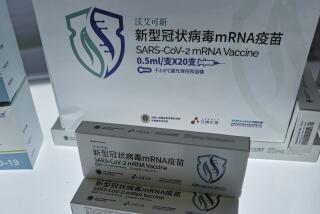China Says No to New Coke, Pepsi Pacts
- Share via
BEIJING — Chinese officials said they won’t approve any new joint ventures with foreign companies such as Coca-Cola Co. or PepsiCo Inc. to build soft-drink bottling plants.
The two U.S. beverage companies said the new limits won’t crimp their plans to expand in China, a fast-growing markets where their sales soared almost 40% last year. Under earlier agreements, the companies say they can still build plants that will give them the capacity to fill the demand for Coke, Pepsi and other drinks for at least several years.
The new limits could shut out rivals such as Cadbury-Schweppes, which has been trying to reach agreements to make drinks such as Seven-Up and Dr Pepper in China.
“What a wonderful boon not to have your competitors come in,” said Tom Pirko, president of BevMark Inc., an industry consultant.
The limit on the plants--which would set the number at about 40--was confirmed by Yang Changzhou, deputy director of China’s Soft Drinks Assn., a semiofficial organization under the purview of the government’s Light Industry Council.
*
The association said companies may still form joint ventures to make other types of beverages, such as fruit drinks. It’s not clear how long the limits will remain in place.
Coca-Cola, the world’s largest soft-drink company, and second-ranked PepsiCo were two of the first U.S. companies to set up business in China, starting in the 1970s. Since then, beverage makers worldwide have targeted the nation, with its huge population and potential for economic growth, as a key market for sales.
Coke and Pepsi, which have each said they would invest $500 million in China by 1998, are gaining an ever larger share of the nation’s soft-drink market--rising to 42% last year from a one-third share in 1994.
“China’s soft-drinks market is in chaos,” said Si Qilu, an official at the soft-drinks association.
Of China’s seven large domestic beverage companies, only one isn’t part of a joint venture with Coke or Pepsi.
Pirko said limiting the number of bottling ventures at 40 will still restrict sales of the two beverage giants because there is a lot more potential for growth than what those plants would serve.
“This is an artificial constraint,” he said. “There’s a lot more room for bottling plants.”
The companies, though, could boost production by adding capacity to existing plants, analysts said.
“The impact on the business would be limited in the short term,” said CS First Boston analyst Martin Romm. “In the long term, they have to have more plants.”
Atlanta-based Coca-Cola signed an agreement in 1993 with the Chinese government to build 10 plants by 1997, of which three have been built, said spokeswoman Kathryn Norton.
That would give the company a total of 23 plants, which she said would give Coke the capacity to reach 90% of China’s population.
“With our infrastructure plans on track, we don’t believe the announcement will significantly impact our future growth,” she said.
Purchase, N.Y.-based PepsiCo is in a similar position. It signed an agreement in 1994 to build 10 plants by 1998--two have been built--giving it a total of 18 plants, said Ken Ross, vice president for international public affairs for PepsiCo’s beverage business.
*
With those plants in place, Pepsi is expecting to quadruple unit sales by 2000 to a rate of 500 million cases a year.
“Simply fulfilling that contract is going to give us gads of production well into the next century,” Ross said.
Coke outsells PepsiCo by a four-to-one margin in China, Coca-Cola President Douglas Ivester said recently.
The new limits come amid rising tension in trade relations between China and the U.S.
Earlier this month, the U.S. threatened to impose punitive tariffs on as much as $3 billion in Chinese exports because of concerns about piracy of software. China responded by saying it would retaliate with 100% tariffs on a number of exports if the U.S. makes good on the threat.
A spokeswoman for U.S. Trade Representative Charlene Barshefsky said Wednesday that no U.S. beverage company has filed a complaint with the office about the Chinese decision.
She had no further comment.
Britain’s Cadbury-Schweppes, faced with the new barrier, said it might take advantage of the concession to allow fruit-drinks ventures, instead of going into soft drinks in China.
“Unless you go in with fruit-based products, the indications are that you won’t get [government] approval,” David Wellings, chief executive of the confectionery and soft-drinks company, said in a recent interview.
Wellings said the company was likely not to enter that market for another three to four years.
More to Read
Inside the business of entertainment
The Wide Shot brings you news, analysis and insights on everything from streaming wars to production — and what it all means for the future.
You may occasionally receive promotional content from the Los Angeles Times.









